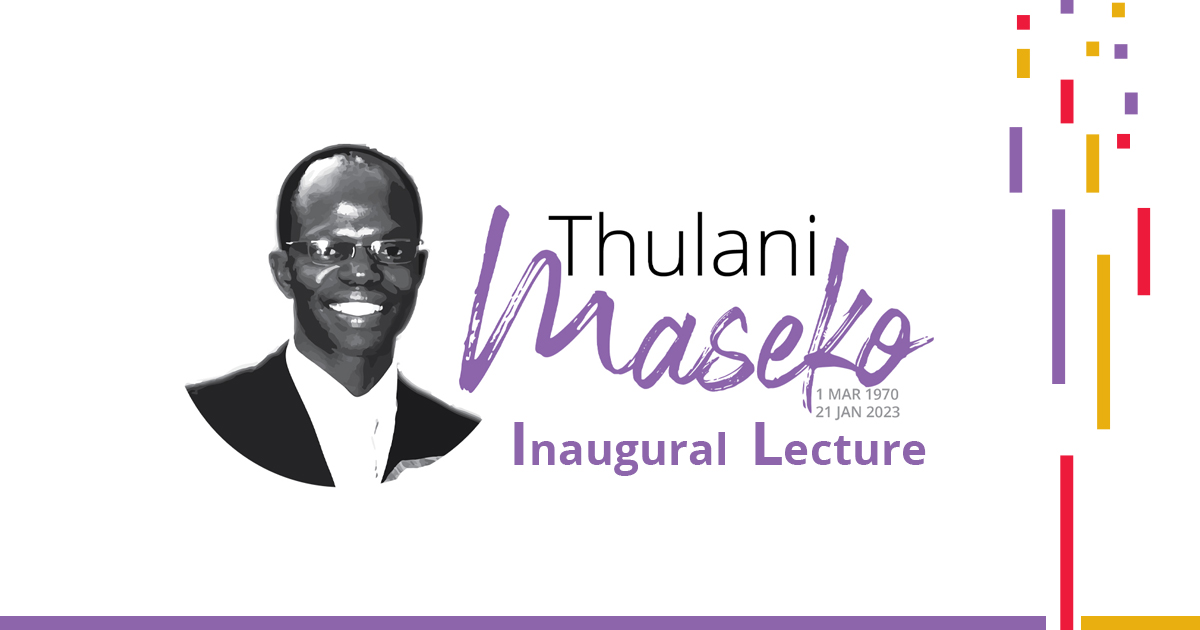The Centre for Human Rights, Faculty of Law, University of Pretoria in collaboration with the University of eSwatini faculty of law, Law Society of eSwatini and CANGO cordially invites you to the Inaugural Memorial lecture in honour of its alumnus, Thulani Rudolf Maseko.
Venue: Esibayeni Lodge in eSwatini
Date: 21 June 2023
Time: 9:00 -13:00
Background
The 1990s third wave of democracy that swept across Eastern Europe and Africa is yet to fully materialize in several African states. In states like Cameroon, Swaziland, Sudan, and Zimbabwe the scourge of “big men” autocratic rulership, the legacy of liberation war movements, violations of constitutionally guaranteed civil and political rights, weakened institutions of democracy, deeply flawed elections, a lack of checks and balances and minimal limitations of governmental power have prevailed since the 1980s.
The people of Cameroon continue to suffer under the dictatorship of President Paul Biya, who has ruled the Central African nation for the past 40 years, consolidating his power through intimidation, politics of divide and rule, use of military courts to persecute dissenting voices and curtailment of civil liberties. Sudanese citizens and residents have faced political persecution, conflict induced mass displacements, extra-judicial killings, flawed elections, and grave human rights violations, with impunity. Its previous leader, Al Bashir ascended to power through a coup in 1989 and after 30 years of his leadership left a legacy of economic collapse, endemic corruption, plunder of mineral resources, human rights violations and entrenched suppression and impunity. There is no reprieve for the people of Sudan as the two warring military leaders in charge of the country wage a civil war in pursuit of selfish political and business interests, leaving a trail of destruction, displacements and death in the capital Khartoum and surrounding places. There remains little hope for a democratic transition in Sudan.
Zimbabwe’s former president, the late Robert Mugabe was in power for nearly four decades. He ruled his country with an iron grip until he was deposed in a peaceful military coup in 2017, dashing the hopes for a democratic transition. His successor, President Mnangagwa has continued with Mugabe’s legacy of flawed elections, violations of human rights, political and judicial persecution of opposition politicians and civil society activists, and weakened judiciary, parliament, and elections management body. The judiciary and the Zimbabwe Electoral Commission have been weaponized to consolidate the incumbent’s hold on power for over four decades in Zimbabwe. Many Zimbabweans have voted with their feet and are scattered across Southern Africa, Europe and Australia as the economic collapse, corruption and autocracy have continued unabated. People have lost confidence in the judiciary and democratic institutions as the country prepares for elections to be held on 23 August.
Since King Mswati III ascended to power in 1986, political parties have essentially remained banned, the judiciary and parliament are controlled by the King, who is above the law, and the constitutionally guaranteed civil liberties are rarely protected by the state. Progressive forces, who have dared to call for democratic transition, have been labelled terrorists with many being charged under the Suppression of Terrorism Act (STA) and the Seditious and Subversive Activities Act (SSAT). The latest casualties of the STA and SSTA are two MPs convicted for expressing the people’s wishes and criticizing current governance systems. From 2015 the Kingdom of Swaziland has increased its oppression by crushing protests, killing activists, silencing, torturing and jailing dissenting voices, capturing the judiciary and weakening parliament. Thulani Maseko was one of the progressive forces who for many years called for a democratic transition in Swaziland. He was assassinated on 21 January and his killers are yet to be arrested and brought before the courts to account for their actions. Other lawyers are now living in fear since Thulani Maseko’s assassination. The September 2023 elections are unlikely to yield any transition from an absolute monarchy to a constitutional liberal democracy.
The Thulani Maseko Memorial Lecture
It is under these dire circumstances that the Centre for Human Rights decided to launch an annual memorial democracy lecture in honour of its alumnus, Thulani Rudolf Maseko. The Centre for Human Rights is partnering with the University of eSwatini faculty of law, Law Society of eSwatini and CANGO in convening this inaugural lecture.
The inaugural lecture will be held on 21 June 2023, five months after his assassination on 21 January 2023. The lecture will help answer so many questions on the challenges of democratisation in the four African states. Do people really get the leaders they deserve? Why have these four states failed to transition from autocracy to democracy where institutions of democracy are strong, effective governmental checks and balances exist, civil liberties are respected and protected, and the rule of law is adhered to?
Speakers will suggest a set of recommendations to address the challenges faced by the people of the four selected countries on their road to democratic transition and how to get there. The targeted audience includes lawyers, MPs, judicial officers, CSO activists and students.
For more information, please contact:
Ms Tariro Sekeramayi
Project officer: Democracy and Civic Engagement Unit
Centre for Human Rights
University of Pretoria
Tariro.Sekeramayi@up.ac.za


